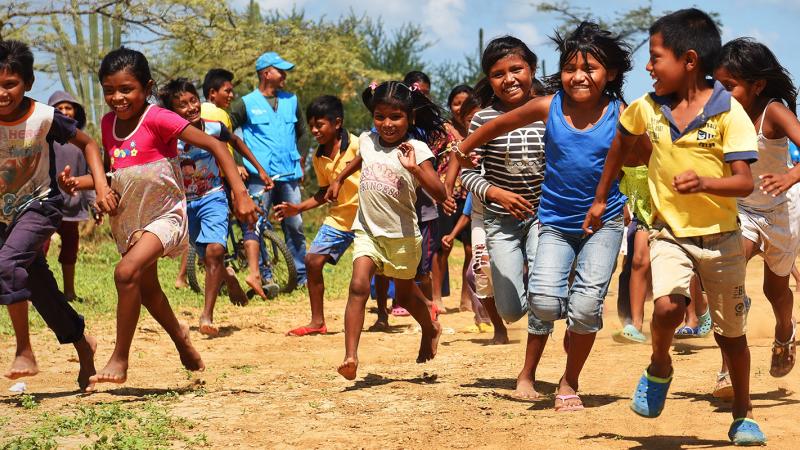The COVID-19 pandemic shows a rapidly increasing demand on health facilities and health care workers threatens to leave some health systems overstretched and unable to operate effectively. Previous outbreaks have demonstrated that when health systems are overwhelmed, mortality from vaccine-preventable and other treatable conditions can also increase dramatically. During the 2014-2015 Ebola outbreak, the increased number of deaths caused by measles, malaria, HIV/AIDS, and tuberculosis attributable to health system failures exceeded deaths from Ebola.
“The best defense against any outbreak is a strong health system,” stressed WHO Director-General Tedros Adhanom Ghebreyesus. “COVID-19 is revealing how fragile many of the world’s health systems and services are, forcing countries to make difficult choices on how to best meet the needs of their people.”
Containing a pandemic is a titanic task, requiring the cooperation of modern-day Titans. On March 11, 2020, the World Health Organization declared a global pandemic of COVID-19, a respiratory disease spread by airborne pathogens from the coronavirus family. Infecting nearly 1,500,000 individuals across 184 countries as of April 9, 2020, and killing over 90,000 worldwide, COVID-19 has tested the tools of global health governance that are designed to protect populations. One such tool is the International Health Regulations (“IHR”). As a multinational agreement binding 196 Member States to monitor and report international health threats, the IHR seeks to coordinate a balanced public health response, while minimizing disruption to international travel and trade and upholding human rights. Mandating protocols to detect, assess, and report outbreaks, the IHR requires Member States to implement core capacities designed to equip national disease outbreak responses. Importantly, the IHR also gives the WHO’s Director-General the power to declare a public health emergency of international concern (“PHEIC”), which mobilizes coordinated international action. Indeed, states shoulder much of the responsibility to generate and report the public health metrics required to trigger any PHEIC notification. The IHR reflects an accumulation of the lessons that past pandemics have taught the global community. But as the world watches COVID-19 take its toll, the future of these regulations remains uncertain.
This Research Guide is intended as a starting point for research on Health. It provides the basic legal materials available in the Peace Palace Library, both in print and electronic format. Handbooks, leading articles, bibliographies, periodicals, serial publications and documents of interest are presented in the Selective Bibliography section. Links to the PPL Catalogue are inserted. The Library's subject heading (keyword) Health is instrumental for searching through the Catalogue. Special attention is given to our subscriptions on databases, e-journals, e-books and other electronic resources. Finally, this Research Guide features links to relevant websites and other online resources of particular interest.
Sources of international law
Treaties
The WHO Framework Convention on Tobacco Control (WHO FCTC) is the first international treaty negotiated under the auspices of WHO. It was adopted by the World Health Assembly on 21 May 2003 and entered into force on 27 February 2005. It has since become one of the most rapidly and widely embraced treaties in United Nations history.
Soft Law
Global health law is not an organized legal system, with a unified treaty-monitoring body, such as the World Trade Organization. However, there is a network of treaties and so-called “soft” law instruments that powerfully affect global health, many of which have arisen under the auspices of the World Health Organization (WHO). Global health law has been defined as the legal norms, processes, and institutions that are designed primarily to attain the highest possible standard of physical and mental health for the world's population.
Reference works
- Lee, K. and Fang, J., Historical Dictionary of the World Health Organization, Lanham, Scarecrow Press, 2013.
- Schrecker, T. The Ashgate Research Companion to the Globalization of Health Farnham, Ashgate, 2012.
- Ferraud-Ciandet, N., Protection de la santé et sécurité alimentaire en droit international, Bruxelles, Larcier, 2009.
- Burci, G.L. and C. Vignes, World Health Organization, The Hague, Kluwer Law International, 2004.
Recent books and peer-reviewed articles
- Collins, J., Legalising the Drug Wars: a Regulatory History of UN Drug Control, Cambridge; New York, Cambridge University Press, 2022.
- Gostin, Lawrence O., and Benjamin Mason Meier, editors. Global Health Law and Policy : Ensuring Justice for a Healthier World. Oxford University Press, 2023.
- Vedaschi, Arianna, editor. Governmental Policies to Fight Pandemic : The Boundaries of Legitimate Limitations on Fundamental Freedoms. Brill, 2024.
For all peer-reviewed articles in the PPL Catalogue, click here.
Periodicals, serial publications
- Actes officiels de l'Organisation Mondiale de la Santé
- Basic Documents
- Documents fondamentaux
- Official Records of the World Health Organization
Bibliographies
- Max Planck Encyclopedia of Public International Law, World Health Organization, by Yves Beigbeder.
- Max Planck Encyclopedia of Public International Law, Public Health, International Cooperation, by Makane Moise Mbengue.
- Max Planck Encyclopedia of Public International Law, Health, Right to, International Protection, by Eibe Riedel.
- World Health Organization
- Research Guide on Global Health Law, Georgetown Law Library
- Research Guide on International Health Law, by Chenglin Liu
- Institut de Droit International - Twelfth Commission: Epidemics and International Law - Report - Epidemics and International Law / Les épidémies et le droit international, Rapporteur: Shinya Murase, 30 December 2020.
- Institut de Droit International - Twelfth Commission: Epidemics and International Law - Online Session - 2021 - Resolution - 12 RES EN 4 September 2021
